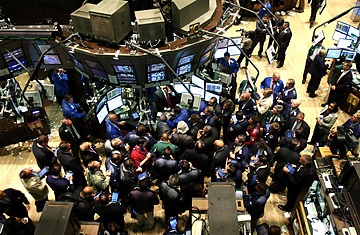
Traders work on the floor of the New York Stock Exchange
(2 of 3)
So while some value investors, most notably Graham's protégé Warren Buffett, have recently announced that they're in a buying mood, that's not necessarily a signal that the market has bottomed out.
Buffett's most famous market pronouncement came in October 1974, when he told Forbes that, with the S&P 500 down in the low 60s after peaking at 120 the year before, he felt "like an oversexed guy in a whorehouse. This is the time to start investing." (The quote is from Roger Lowenstein's Buffett. In print, Forbes changed "whorehouse" to "harem.") That actually was pretty well timed — the market rebounded sharply in 1975. Then it dropped again, and the long secular bear market that had begun in 1965 didn't end until 1982. Buffett made tons of money in the second half of the 1970s — because he was a really smart investor and because he'd set up his investment vehicle, Berkshire Hathaway, as a self-funded enterprise that didn't rely on cash from (and thus didn't have to respond to the whims of) outside investors. But the S&P 500 was, when adjusted for the double-digit inflation of those days, actually lower in mid-1982 than when Buffett spoke out in October 1974.
Add in dividends — the yield on the S&P 500 was 5.43% in 1974; it's just over 3% now — and stock-market investors came out modestly in the black over that stretch. They would have done much better, though, putting their money in gold or real estate or baseball cards. Then again, most of the gold bugs and baseball fans probably missed out on the market's great turn in 1982. Buffett and his fellow value investors did not.
